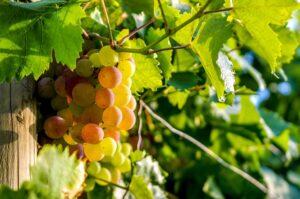Hungarian and Italian researchers say birds and bats can protect vineyards
According to a joint study by the HUN-REN Ecological Research Center and the University of Milan, birds and bats can protect vineyards, and flying predators not only reduce the number of pests but also reduce crop losses.

(Photo: Pixabay)
The research also revealed that forested environments are particularly favorable for the presence of bats, the HUN-REN Hungarian Research Network said in a statement sent to MTI on Monday. As they wrote, intensive methods of modern agriculture – such as the increased use of pesticides – seriously endanger the biodiversity of agricultural habitats and the ecosystem services associated with them. Vineyards are particularly vulnerable, as they are threatened by several pests, while few people apply sustainable forms of farming, they added. According to the information, researchers from the HUN-REN Ecological Research Center and the University of Milan studied the role of birds and bats in the natural regulation of grape pests. Their joint research showed that these predators not only help regulate pest populations, but also bring economic benefits to producers. They highlighted that the research examined Hungarian vineyards, along different farming methods (organic and integrated) and landscape environments (forested and open agricultural landscapes).
Experiments conducted by excluding birds and bats with cages showed that where these predators were present, less crop damage and lower pest numbers were registered
Wooded landscapes were particularly favorable to the spring activity of bats, which reduced the presence of grapevine moths, having a direct impact on crop yields – they added. “The presence of these predators can be supported by maintaining connected landscapes that include native and deciduous forest patches, hedgerows and tree groups, which provide them with abundant food sources and suitable nesting sites,” the statement quotes Dávid Korányi, a researcher at the HUN-REN Ecological Research Center who led the field study. The results of the study showed that leaf and fruit damage was consistently higher on excluded vines, which confirms the role of birds and bats in pest control, the summary reads.
The study also emphasizes the importance of viticulture in pest control
In this regard, the lead author of the research, Péter Batáry, highlighted: “Biological control of pests can be further enhanced through organic farming, which, without herbicides and synthetic insecticides, promotes the settlement of beneficial arthropods and increases the predation pressure they provide in vineyards.” The results of the Hungarian and Italian researchers were published in the Journal of Applied Ecology, the release states.
MTI
Related news
The guarantee of support for farmers is the preservation of an independent, autonomous agricultural policy
🎧 Hallgasd a cikket: Lejátszás Szünet Folytatás Leállítás Nyelv: Auto…
Read more >Related news
Amikor a megszámlálhatatlan megszámlálhatóvá válik
🎧 Hallgasd a cikket: Lejátszás Szünet Folytatás Leállítás Nyelv: Auto…
Read more >New country director at the helm of JYSK Hungary
🎧 Hallgasd a cikket: Lejátszás Szünet Folytatás Leállítás Nyelv: Auto…
Read more >








